There are many web servers available for both Windows and Linux, and the best one for you will depend on your specific needs and requirements. Some of the most popular web servers for these two operating systems include Apache, Nginx, and Microsoft IIS. Here in this article, we will discuss the Best Web Servers available there for windows and Linux systems.
Apache is an open-source web server that is widely used on both Windows and Linux and is known for its flexibility and extensibility. Nginx is another popular open-source web server that is known for its high performance and low resource usage. Microsoft IIS is a proprietary web server that is only available on Windows and is commonly used in conjunction with the ASP.NET framework.
What is a web Server?
A web server is a piece of software that is responsible for accepting incoming requests from clients and returning the appropriate response. These requests are typically made using the HTTP protocol, and the web server is responsible for handling the details of the protocol and providing the necessary responses. Web servers are the foundation of the modern web, as they are the software that enables users to access and interact with websites and web applications. When you enter a URL into your web browser, the browser sends a request to the web server associated with that URL, and the server responds by sending back the content of the page, such as HTML, CSS, and JavaScript files. The web server then processes these files and returns the final, rendered webpage to the user’s browser.
Why do we need a web server?
Web servers are necessary for hosting websites and web applications, and they provide a number of important functions. First and foremost, web servers provide the infrastructure that allows users to access and interact with websites and web applications over the internet. Without web servers, users would not be able to view or use these online resources. Web servers are also responsible for processing and responding to requests from clients, such as web browsers. This involves receiving the request, interpreting it, and then providing the appropriate response, such as sending back the requested webpage or other content. Additionally, web servers can provide security features, such as SSL/TLS encryption, to protect the privacy and integrity of the information being transmitted between the server and its clients. Overall, web servers are essential for the functioning of the modern web, and without them, the internet as we know it would not be possible.
Best Web Servers for Windows and Linux
Here is a list of some popular web servers:
- Apache HTTP Server
- LiteSpeed
- Microsoft IIS
- Nginx
- Lighttpd
These are just a few examples, and there are many other web servers available. It’s worth noting that the choice of a web server can depend on a variety of factors, such as the specific requirements of the website or web application being hosted, the operating system and hardware being used, and the level of performance and scalability needed.
Apache HTTP Server
Apache HTTP Server, commonly referred to as Apache, is an open-source web server that is widely used on the internet. It is developed and maintained by the Apache Software Foundation, and is available for a variety of operating systems, including Windows, Linux, and macOS.
Apache is known for its flexibility, stability, and security, and it is capable of handling a large number of concurrent connections. It also supports a wide range of features and technologies, including support for multiple protocols (such as HTTP, HTTPS, and FTP), scripting languages (such as PHP and Perl), and database systems (such as MySQL and MariaDB).
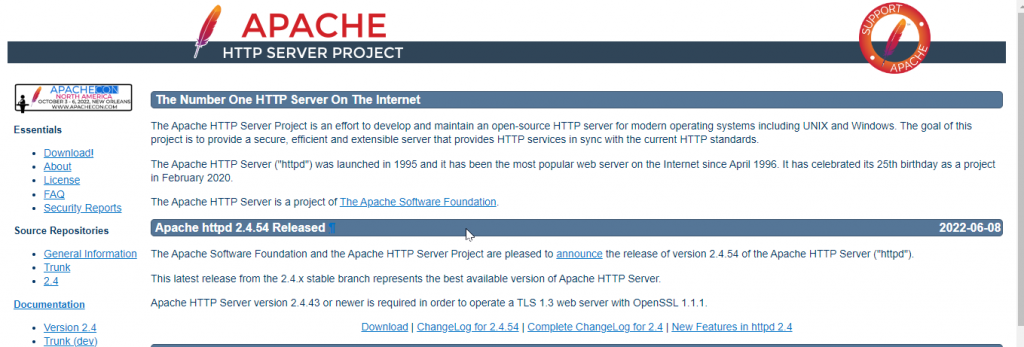
One of the key strengths of Apache is its modular design, which allows users to customize the server by enabling or disabling specific features, or by adding new modules to extend its functionality. This makes it a popular choice for many web hosting providers, as well as for organizations and individuals who need a powerful and flexible web server solution.
Key features of Apache
Here are some key features of the Apache HTTP Server:
- Support for multiple protocols: Apache supports a wide range of protocols, including HTTP, HTTPS, FTP, and others. This allows it to be used for a variety of purposes, such as hosting websites, serving files, and providing secure communication channels.
- Modular design: Apache is designed as a modular server, with a core set of features that can be extended by enabling or disabling specific modules. This allows users to customize the server to meet their specific needs and requirements.
- Virtual hosting: Apache supports the concept of virtual hosting, which allows a single server to host multiple websites or web applications. This is accomplished by using different IP addresses, hostnames, or ports for each virtual host.
- Security: Apache is known for its security features, which include support for encrypted communication using SSL/TLS, authentication mechanisms, and access control. It also includes a number of security-related modules that can be enabled to provide additional protection.
- Performance: Apache is capable of handling a large number of concurrent connections, and it includes a number of features and technologies that can help improve its performance, such as caching, load balancing, and support for FastCGI.
Overall, Apache HTTP Server is a powerful, flexible, and secure web server that is widely used on the internet. Its modular design and support for multiple protocols, scripting languages, and databases make it a popular choice for many web hosting providers and organizations.
Pricing of Apache
Apache HTTP Server is an open-source software project, which means that it is freely available for anyone to download and use. There are no licensing fees or costs associated with using Apache, and it can be freely distributed and modified according to the terms of the Apache License.
However, while the software itself is free, there may be costs associated with other factors, such as the hardware and operating system needed to run the server, the time and resources required to configure and maintain it, and the costs of any additional software or services that may be needed (such as scripting languages or database systems).
Ultimately, the pricing of the Apache HTTP Server will depend on the specific needs and requirements of the user, as well as the resources and costs associated with implementing and maintaining the server.
LiteSpeed
LiteSpeed is a web server software that is designed to be a high-performance and scalable alternative to other popular web servers, such as Apache and Nginx. It is developed and maintained by LiteSpeed Technologies, and is available for a variety of operating systems, including Linux, Windows, and macOS.
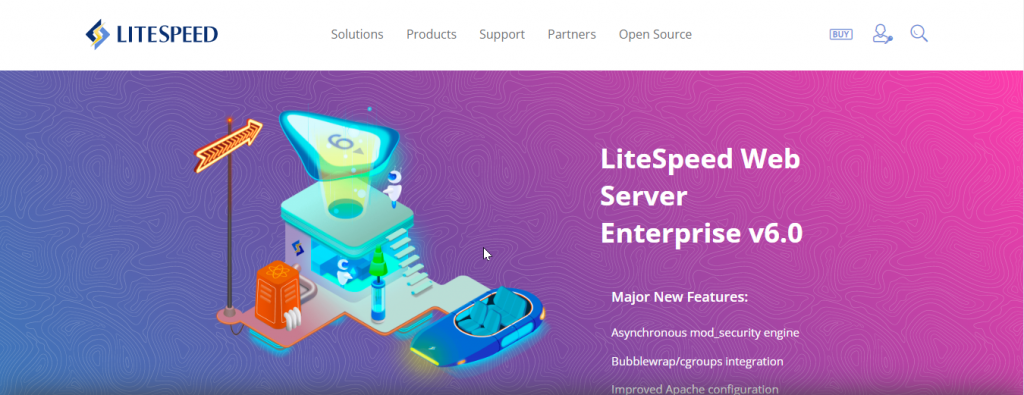
LiteSpeed is known for its speed and efficiency, and it is capable of handling a large number of concurrent connections without significant performance degradation. It also includes a number of features and technologies that can help improve its performance, such as support for HTTP/2, QUIC, and HTTP/3, as well as built-in caching and compression.
In addition to its performance advantages, LiteSpeed also includes a number of security and management features, such as support for encrypted communication using SSL/TLS, a user-friendly control panel, and integration with popular web hosting control panels. It also has a modular design, which allows users to customize the server by enabling or disabling specific features or modules.
Overall, LiteSpeed is a powerful and efficient web server that is suitable for a wide range of applications and environments. It is an especially good choice for users who need high performance and scalability, as well as robust security and management features.
Key features of LiteSpeed
Here are some key features of the LiteSpeed web server:
- High performance: LiteSpeed is designed to be a high-performance web server, and it is capable of handling a large number of concurrent connections without significant performance degradation. It includes support for technologies such as HTTP/2, QUIC, and HTTP/3, as well as built-in caching and compression, to help improve its speed and efficiency.
- Modular design: LiteSpeed is a modular web server, which means that its core features can be extended by enabling or disabling specific modules. This allows users to customize the server to meet their specific needs and requirements.
- Security: LiteSpeed includes a number of security features, such as support for encrypted communication using SSL/TLS, authentication mechanisms, and access control. It also includes security-related modules that can be enabled to provide additional protection.
- Management: LiteSpeed includes a user-friendly control panel that allows users to easily manage the server and its settings. It also has integration with popular web hosting control panels, which makes it easy to use with existing hosting environments.
- Compatibility: LiteSpeed is compatible with a wide range of technologies and platforms, including popular scripting languages (such as PHP and Python), database systems (such as MySQL and MariaDB), and web application frameworks (such as WordPress and Laravel).
Overall, LiteSpeed is a powerful and efficient web server that is suitable for a wide range of applications and environments. Its high performance, modular design, security features, and compatibility with a variety of technologies make it a popular choice for many users.
LiteSpeed Pricing:
LiteSpeed offers two types of servers one is open Litespeed which is totally free and doesn’t have any limitations other one ios paid and that is called LiteSpeed ent.
Nginx
Nginx is a web server that is often used as a reverse proxy, load balancer, and HTTP cache. It is known for its high performance, stability, and low resource consumption. Nginx can be used to host websites and serve files on the web, as well as to route traffic to other web applications or microservices. It is open-source software and is widely used on the internet.
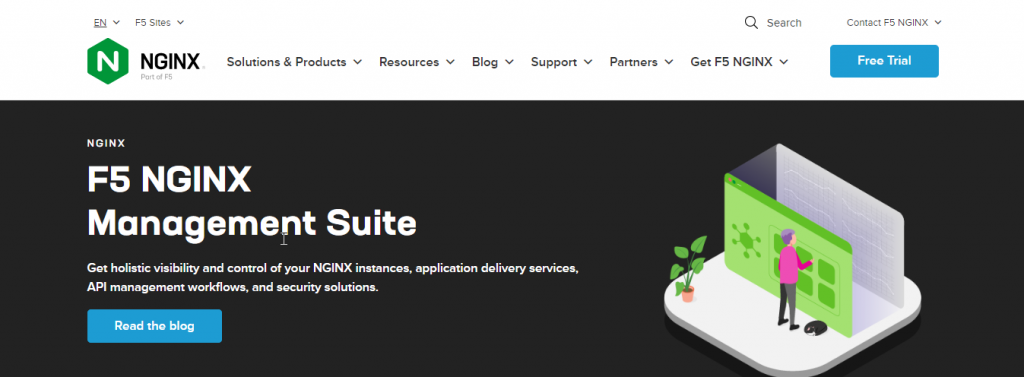
Key features Nginx
Some key features of Nginx include:
- Reverse proxy capabilities: Nginx can be used to proxy incoming requests to other web servers or application servers, providing an additional layer of security and performance.
- Load balancing: Nginx can distribute incoming requests across multiple servers, improving the performance and scalability of web applications.
- HTTP caching: Nginx can cache commonly requested content, reducing the workload on the origin server and improving the response time for end users.
- High performance: Nginx is known for its ability to handle a large number of concurrent connections and requests efficiently.
- Flexible configuration: Nginx can be configured to handle a wide range of use cases and can be customized to meet specific requirements.
- Extension support: Nginx can be extended with third-party modules to add additional functionality, such as support for additional protocols or load-balancing algorithms.
Pricing of Nginx
Nginx is open-source software and is available to use at no cost. However, there are commercial versions of Nginx that are available from the company Nginx, Inc. These versions include additional features and support options, and they are priced on a subscription basis. For more information on pricing, you can visit the Nginx website or contact the company directly.
Microsoft IIS
Microsoft IIS (Internet Information Services) is a web server software developed by Microsoft. It is used to host websites and other web-based applications on the internet or on a local network. IIS provides a user-friendly graphical interface that allows administrators to manage their web server and its associated services, such as FTP and ASP.NET. It also provides a range of security features to help protect websites and web-based applications from cyber attacks.
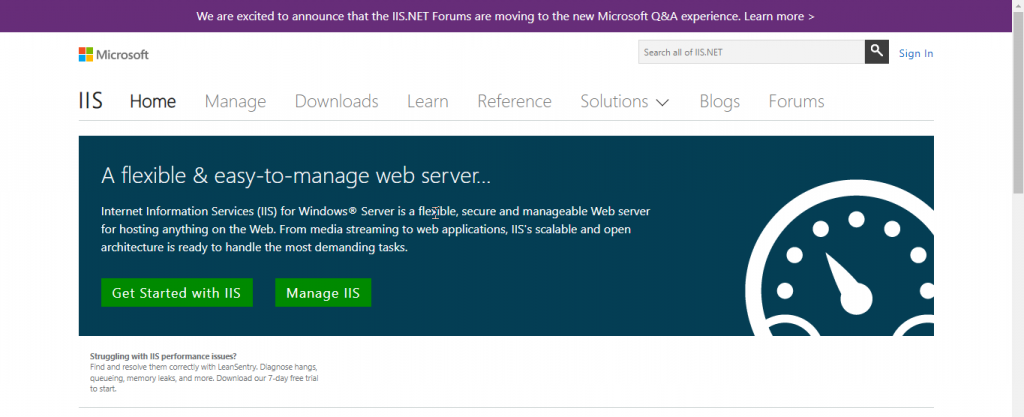
Key features of Microsoft IIS
Some key features of Microsoft IIS include:
- Support for a wide range of web-based protocols, including HTTP, HTTPS, FTP, FTPS, and SMTP.
- A user-friendly graphical interface for managing web server settings and services.
- Support for popular scripting languages, such as ASP.NET, PHP, and Perl.
- Built-in security features, such as secure sockets layer (SSL) and transport layer security (TLS) support, to help protect websites and web-based applications from cyber attacks.
- The ability to host multiple websites on a single web server.
- Support for web-based applications, such as content management systems and e-commerce platforms.
- Easy integration with other Microsoft products, such as the .NET framework and Microsoft SQL Server.
- Regular updates and support from Microsoft.
Pricing of Microsoft IIS
Microsoft IIS is included with most versions of the Windows operating system, so there is no additional cost to use it. However, if you need to purchase a copy of Windows, the pricing will vary depending on the edition you choose and whether you purchase it as a standalone product or as part of a bundle or subscription plan. You can check the latest pricing for Windows on the Microsoft website. Additionally, some features and add-ons for IIS may require additional licensing fees. It’s best to consult with a Microsoft representative for more information about pricing for specific IIS features and add-ons.
Lighttpd
Lighttpd is a web server software. It is designed to be lightweight and fast, in order to handle high-traffic and high-performance environments. It is commonly used for high-performance websites and web applications and can be easily integrated with other software such as PHP and MySQL to create a powerful and flexible web platform. Some of the features of Lighttpd include support for FastCGI, CGI, and TLS/SSL, as well as URL rewriting and load balancing capabilities.
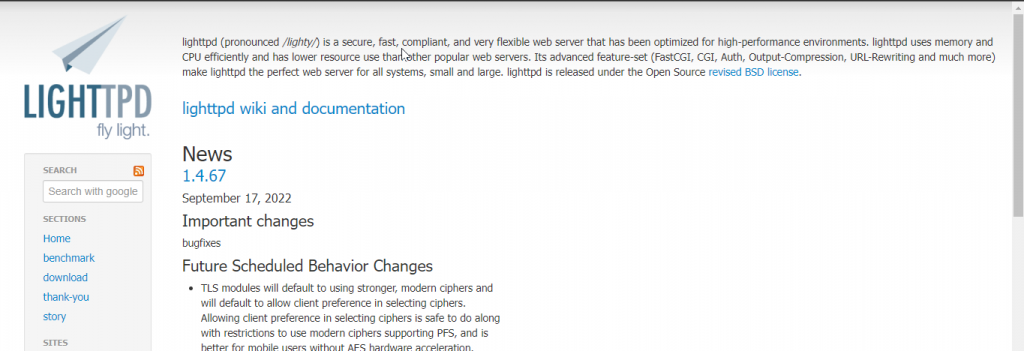
Key features of Lighttpd
As I mentioned earlier, some of the key features of Lighttpd include:
- Lightweight and fast: Lighttpd is designed to be lightweight and fast, making it well-suited for handling high traffic and high performance environments.
- Support for FastCGI and CGI: Lighttpd supports the FastCGI and CGI protocols, which allow it to run scripts written in languages such as PHP and Perl.
- URL rewriting: Lighttpd has built-in support for URL rewriting, which allows you to clean up and customize the URLs of your website, making them more user-friendly and easier to remember.
- TLS/SSL support: Lighttpd has built-in support for TLS/SSL encryption, which allows you to secure your website and protect sensitive information.
- Load balancing: Lighttpd has built-in support for load balancing, which allows you to distribute incoming traffic across multiple servers, improving performance and reliability.
- Modularity: Lighttpd is designed to be modular, with a wide range of optional modules that you can enable or disable depending on your needs. This allows you to customize Lighttpd to fit the specific requirements of your website or web application.
Pricing of Lighttpd
Lighttpd is open-source software, which means it is available to download and use for free. You can download the latest version of Lighttpd from its official website, or from other online sources such as GitHub or SourceForge. Once you have downloaded and installed Lighttpd, you can use it without any restrictions or limitations. There are no licensing fees or other costs associated with using Lighttpd.
How to Install and configure the OpenLiteSpeed server on Ubuntu?
